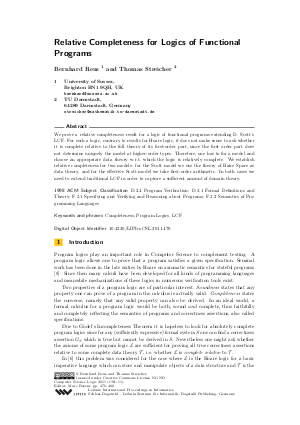Relative Completeness for Logics of Functional Programs
Authors Bernhard Reus, Thomas Streicher
-
Part of:
Volume:
Computer Science Logic (CSL'11) - 25th International Workshop/20th Annual Conference of the EACSL (CSL 2011)
Part of: Series: Leibniz International Proceedings in Informatics (LIPIcs)
Part of: Conference: Computer Science Logic (CSL) - License:
 Creative Commons Attribution-NonCommercial-NoDerivs 3.0 Unported license
Creative Commons Attribution-NonCommercial-NoDerivs 3.0 Unported license
- Publication Date: 2011-08-31
File

PDF
LIPIcs.CSL.2011.470.pdf
- Filesize: 0.49 MB
- 11 pages
Document Identifiers
Subject Classification
Keywords
- completeness
- program logics
- LCF
Metrics
- Access Statistics
-
Total Accesses (updated on a weekly basis)
0PDF Downloads0Metadata Views
Abstract
We prove a relative completeness result for a logic of functional programs extending D. Scott's LCF. For such a logic, contrary to results for Hoare logic, it does not make sense to ask whether it is complete relative to the full theory of its first-order part, since the first order part does not determine uniquely the model at higher-order types. Therefore, one has to fix a model and choose an appropriate data theory w.r.t. which the logic is relatively complete. We establish relative completeness for two models: for the Scott model we use the theory of Baire Space as data theory, and for the effective Scott model we take first-order arithmetic. In both cases we need to extend traditional LCF in order to capture a sufficient amount of domain theory.
Cite As Get BibTex
Bernhard Reus and Thomas Streicher. Relative Completeness for Logics of Functional Programs. In Computer Science Logic (CSL'11) - 25th International Workshop/20th Annual Conference of the EACSL. Leibniz International Proceedings in Informatics (LIPIcs), Volume 12, pp. 470-480, Schloss Dagstuhl – Leibniz-Zentrum für Informatik (2011)
https://doi.org/10.4230/LIPIcs.CSL.2011.470
BibTex
@InProceedings{reus_et_al:LIPIcs.CSL.2011.470,
author = {Reus, Bernhard and Streicher, Thomas},
title = {{Relative Completeness for Logics of Functional Programs}},
booktitle = {Computer Science Logic (CSL'11) - 25th International Workshop/20th Annual Conference of the EACSL},
pages = {470--480},
series = {Leibniz International Proceedings in Informatics (LIPIcs)},
ISBN = {978-3-939897-32-3},
ISSN = {1868-8969},
year = {2011},
volume = {12},
editor = {Bezem, Marc},
publisher = {Schloss Dagstuhl -- Leibniz-Zentrum f{\"u}r Informatik},
address = {Dagstuhl, Germany},
URL = {https://drops.dagstuhl.de/entities/document/10.4230/LIPIcs.CSL.2011.470},
URN = {urn:nbn:de:0030-drops-32509},
doi = {10.4230/LIPIcs.CSL.2011.470},
annote = {Keywords: completeness, program logics, LCF}
}
